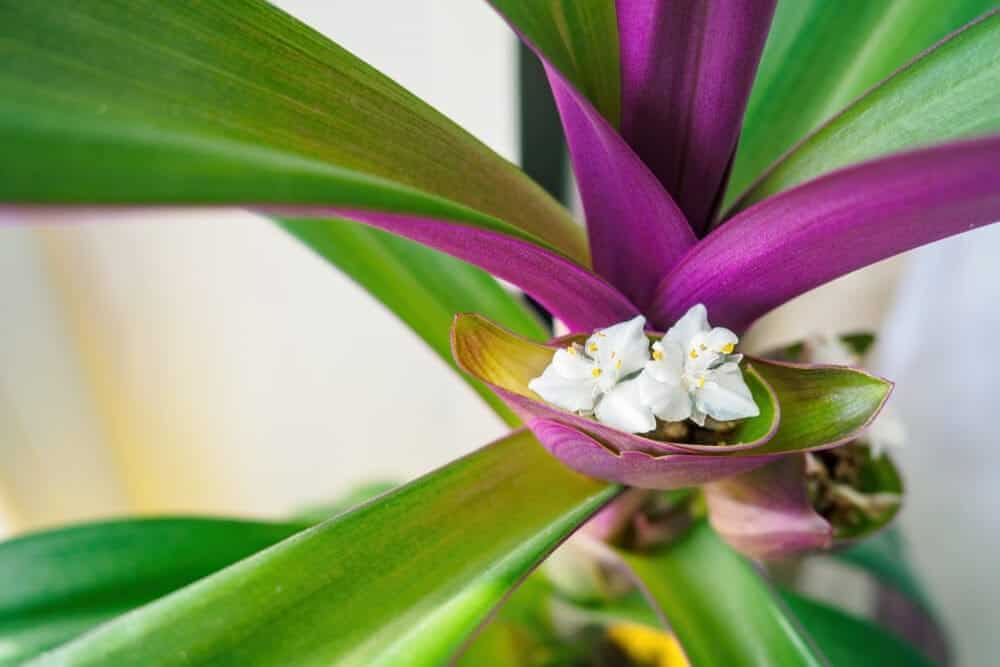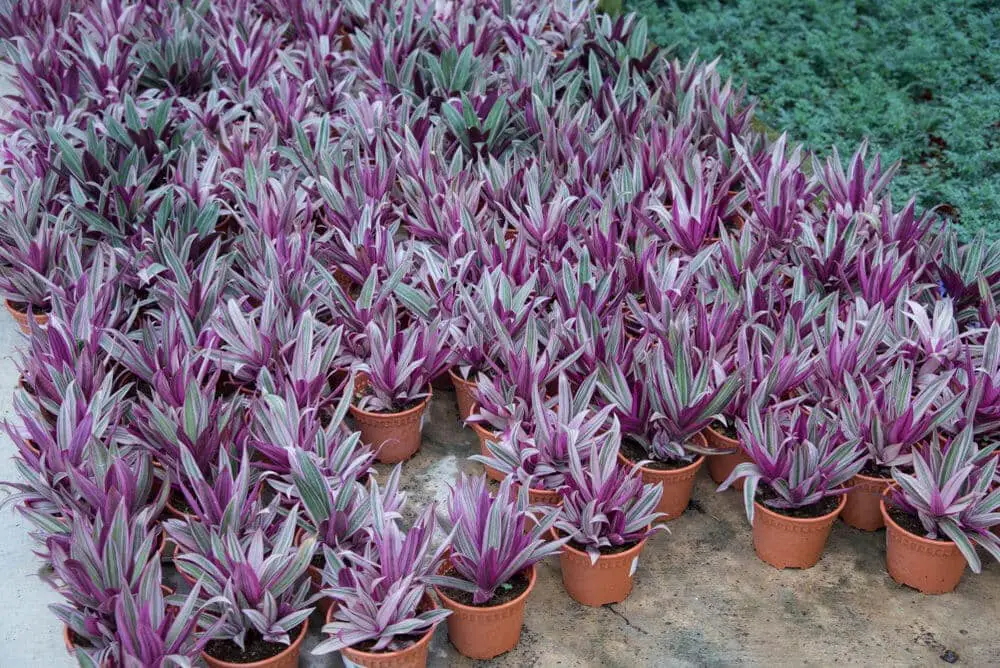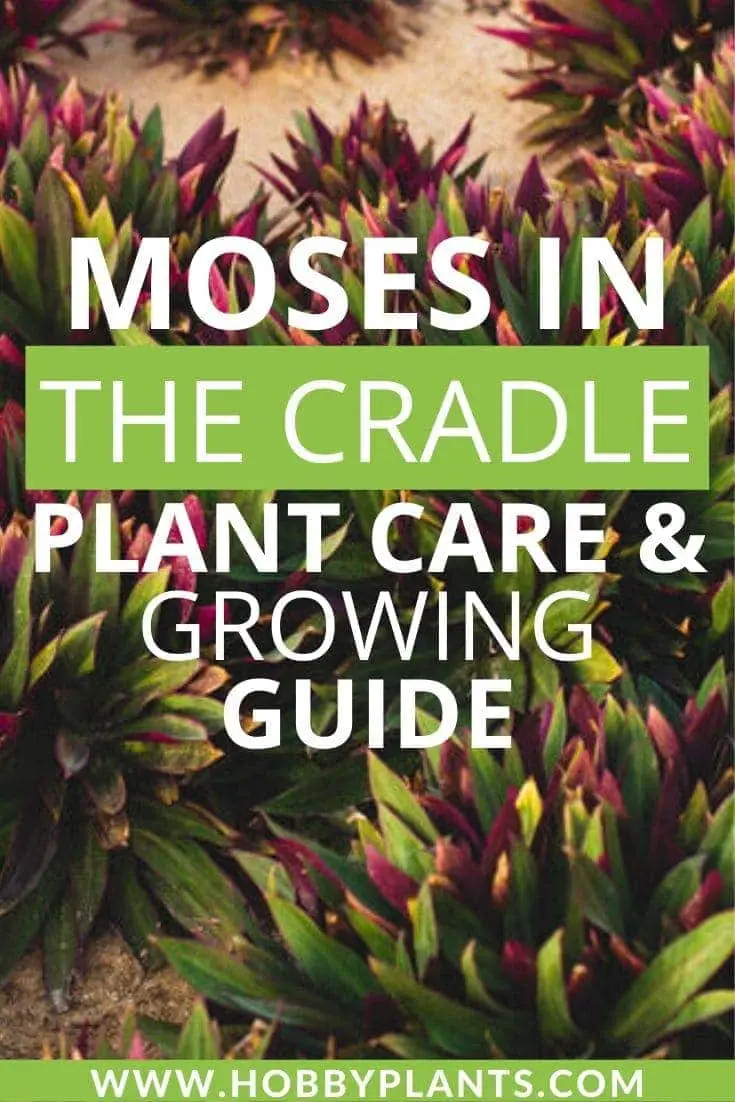Moses in the Cradle plant is not very challenging to grow or maintain whatsoever.
If you want a houseplant that will enhance the aesthetic of your home’s interior year round, this is a great choice. Before you start growing this plant, there are a number of things you’ll need to be aware of.
Moses in the Cradle Plant Care & Growing Guide
1. Light Requirement
This plant needs to be put in bright but indirect light throughout the year. This will ensure vibrant foliage and flowers for the best overall appearance. You can grow this plant in low light, but it is not recommended.
If you are growing your Moses in the Cradle plant outside, keep it in partial shade. If it is inside, it should be a few feet from a curtained window that receives bright sunlight. This is an important part of providing your plant with the nourishment it needs to remain healthy.
Make sure that your plant gets a minimum of six hours of bright sunlight each day. There is simply no way for it to stay healthy otherwise.
2. Water
The soil that you keep this plant in should be kept moist throughout in the spring and autumn months. When winter rolls around, you’ll want to wait until the soil gets dry to water it. If the top inch of the plant’s soil is dry, you can give it a drink.

3. Climate
This plant can be grown in USDA hardiness zones of 9 to 11. It does best in temperate climates.
4. Soil
An all-purpose potting mix for houseplants will be perfect for a Moses in the Cradle. Make sure that the soil drains well so that the roots don’t start rotting.
5. Temperature
The ideal temperature range for a Moses in the Cradle plant is 60 to 85 degrees Fahrenheit. These plants actually prefer cooler temperatures at night. It is best to keep them in medium to high humidity during the daytime hours.
6. Repotting
Repotting with this plant should be done in the spring time, as this is when the roots start filling up the container. You’ll want to transfer it to a pot that is one size larger. This should only be necessary every two years or so.
Make certain that you choose a new container that has drainage holes. If the pot cannot drain properly, the roots will remain soaked and start rotting.

7. Speed of Growth
When this plant is given adequate sunlight on a daily basis, it can grow fairly quickly. This plant’s growth does not slow down in the winter months like other plants.
8. Height and Spread
A vast majority of Moses in the Cradle plants grow to around a foot tall with a spread of two feet at most. You should make a point of keeping this plant a few feet from others in your garden to avoid issues with the roots getting tangled up.
9. Flowers
This plant produces small but colorful flowers that are somewhat hidden away inside of the leaves. These leaves are white, purple and green. The blossoms this plant produces can appear at any point throughout the year.
10. Trimming
If you want to maintain a good looking plant, you will need to do quite a bit of pruning every time spring rolls around. This will help keep the size and shade of the plant desirable and attractive throughout the rest of the year.
Is the Moses in the Cradle Plant Poisonous?
The sap of the Moses in the Cradle plant is somewhat toxic. You will therefore want to wear gloves when pruning or handling it at all. It is also important that you are careful about keeping it around the house if you have small children or pets that are allowed to roam.
Handling these plants without gloves can lead to significant skin irritation. These plants can also cause severe mouth and throat pain if they are ingested.
How to get Moses in the Cradle Plants to Flower
If you want to get your Moses in the Cradle plant to flower, you will need to keep a humidifier nearby. This will help stimulate the process that the plant uses to bloom. It is also good to have the plant sitting on pebbles.
Common Moses in the Cradle Plant Diseases
Root rot is a very common problem with these plants, and it is usually a result of over watering. It is fairly easy to give this plant too much water, so you need to be mindful and check the soil beforehand. If the soil feels moist, do not water it.
Fungal infections can also cause a lot of damage to these plants. This is sometimes caused by misting too often, or too much humidity. If you are using a humidifier nearby, you’ll want to consider turning it down a bit.
Mealy bugs can be a problem for these plants as well. This problem can be solved by simply spraying them off with a strong stream of water. You can also apply an oily deterrent to the leaves to keep pests off.
Conclusion
- The Moses in the Cradle plant requires bright indirect sunlight to thrive.
- These plants cannot survive in bright direct light, as it scorches their leaves.
- A medium level of humidity will also help this plant to thrive.
- Keep this plant’s soil moist throughout the spring and autumn months.
- You’ll want to wait until the plant’s soil is dry during the winter before watering it.
- You can grow this plant in USDA hardiness zones of 9 through 11.
- These plants prefer a temperature range of 60 to 85 degrees Fahrenheit.
- This plant actually prefers cooler temperatures at night.
- Make sure that you prune this plant a good amount when spring rolls around.
- The flowers this plant produces are somewhat hidden inside the leaves, but they are colorful and vibrant.
- The sap of this plant is toxic, so you should always use gloves when handling it.
- Spider mites and other pests can be a problem, but you can apply an oily deterrent to prevent damage.

Victoria is the owner and main author of hobby plants. She loves spending her free time in her garden planting and taking care of her plants. Victoria hopes you enjoy the content here!
![Mother Of Thousands Plant [Complete Plant Care Guide] Mother Of Thousands Plant [Complete Plant Care Guide]](https://www.hobbyplants.com/wp-content/uploads/2022/07/mother-of-thousands-plant-300x158.jpg)
![Majesty Palm Plant Care: [Complete Beginner's Guide] Majesty Palm Plant Care: [Complete Beginner's Guide]](https://www.hobbyplants.com/wp-content/uploads/2022/08/majesty-palm-care-300x158.jpg)
![Exotic Angel Plant Care: [Complete Beginner's Guide] Exotic Angel Plant Care: [Complete Beginner's Guide]](https://www.hobbyplants.com/wp-content/uploads/2022/08/exotic-angel-plant-care-300x158.jpg)
![Snow White Waffle Plant: [Complete Care Guide] Snow White Waffle Plant: [Complete Care Guide]](https://www.hobbyplants.com/wp-content/uploads/2022/08/snow-white-waffle-plant-300x158.jpg)
![Waffle Plant Care: [Complete Beginner's Guide] Waffle Plant Care: [Complete Beginner's Guide]](https://www.hobbyplants.com/wp-content/uploads/2022/08/waffle-plant-300x158.jpg)
![Bird Of Paradise Plant Care: [Complete Beginner's Guide] Bird Of Paradise Plant Care: [Complete Beginner's Guide]](https://www.hobbyplants.com/wp-content/uploads/2022/08/bird-of-paradise-plant-300x158.jpg)
![Purple Passion Plant Care: [Complete Beginner's Guide] Purple Passion Plant Care: [Complete Beginner's Guide]](https://www.hobbyplants.com/wp-content/uploads/2022/08/purple-passion-plant-care-300x158.jpg)
![China Doll Plant Care: [Complete Beginner's Guide] China Doll Plant Care: [Complete Beginner's Guide]](https://www.hobbyplants.com/wp-content/uploads/2022/09/china-doll-plant-care-300x158.jpg)
![Polka Dot Plant Care: [Complete Beginner's Guide] Polka Dot Plant Care: [Complete Beginner's Guide]](https://www.hobbyplants.com/wp-content/uploads/2022/09/polka-dot-plant-300x158.jpg)
![Mona Lisa Lipstick Plant Care: [Complete Beginner's Guide] Mona Lisa Lipstick Plant Care: [Complete Beginner's Guide]](https://www.hobbyplants.com/wp-content/uploads/2022/09/lipstick-plant-mona-lisa-300x158.jpg)
![Yucca Cane Plant Care: [Complete Beginner's Guide] Yucca Cane Plant Care: [Complete Beginner's Guide]](https://www.hobbyplants.com/wp-content/uploads/2022/09/yucca-cane-plant-care-300x158.jpg)
![Bush On Fire Croton Plant Care: [Complete Beginner's Guide] Bush On Fire Croton Plant Care: [Complete Beginner's Guide]](https://www.hobbyplants.com/wp-content/uploads/2022/09/bush-on-fire-croton-300x158.jpg)